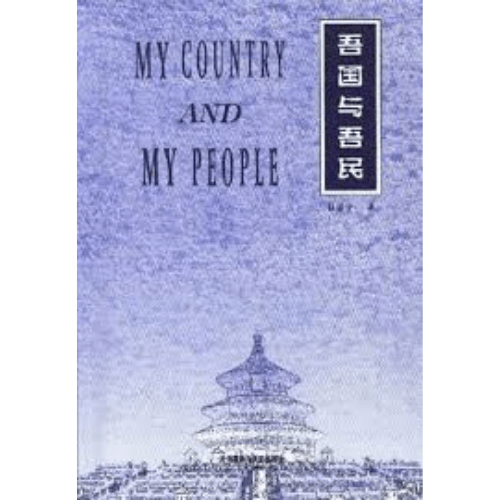
My Country And My People
By Lin YutangIn this atmosphere of change, the present intellectual youth of China has grown up. Where the fathers imbibed the doctrine of Confucius and learned the classics and revolted against them, these young people have been battered by many forces of the new times. They have been taught something of science, something of Christianity, something of atheism, something of free love, something of communism, something of Western philosophy, something of modern militarism, something, in fact, of everything. In the midst of the sturdy medievalism of the masses of their countrymen the young intellectuals have been taught the most extreme of every culture. Intellectually they have been forced to the same great omissions that China has made physically. They have skipped, figuratively speaking, from the period of the unimproved country road to the aero plane era. The omission was too great. The mind could not compensate for it. The spirit was lost in the conflict. The first result, therefore, of the hiatus was undoubtedly to produce a class of young Chinese, both men and women, but chiefly men, who frankly did not know how to live in their own country or in the age in which their country still was. They were for the most part educated abroad, where they forgot the realities of their own race. It was easy enough for various revolutionary leaders to persuade these alienated minds that China's so-called backwardness was due primarily to political and material interference by foreign powers. The world was made the scapegoat for Chinas medievalism. Instead of realizing that China was in her own way making her own steps, slowly, it is true, and somewhatponderously, toward modernity, it was easy hue and cry to say that if it had not been for foreigners she would have been already on an equality, in material terms, with other nations. The result of this was a fresh revolution of a sort. China practically rid herself of her two great grievances outside of Japan, extraterritoriality and the tariff. No great visible change appeared as a consequence. It became apparent that what had been weaknesses were still weaknesses, and that these were inherent in the ideology of the people. It was found, for instance, that when a revolutionary leader became secure and entrenched he became conservative and as corrupt, too often, as an old style official. The same has been true in other histories. There were too many honest and intelligent young minds in China not to observe and accept the truth, that the outside world had very little to do with Chinas condition, and what she had to do with it could have been prevented if China had been earlier less sluggish and her leaders less blind and selfish. Then followed a period of despair and frenzy and increased idealistic worship of the West. The evident prosperity of foreign countries was felt to be a direct fruit of Western scientific development.
Book details
- Paperback
- 343 pages
- English
- 7560014224
- 9787560014227
About Lin Yutang
prolific writer of a wide variety of works in chinese and english; in the 1930s he founded several chinese magazines specializing in social satire and west Read More about Lin Yutang
More Books By Lin Yutang
People who bought this also bought

Unbelievably Good Deal and Great Adventures That You Absolutely Can't Get Unless You're Over 50
Used Book

The Relationship Cure: A 5 Step Guide to Strengthening Your Marriage, Family, and Friendships
Used Book

Feeling Good: The New Mood Therapy (Visible wear and tear on cover)
Used Book

We're Going to Need More Wine: Stories That Are Funny, Complicated, and True
New Book

Signspotting : Absurd and Amusing Signs from Around the World by Doug Lansky
Used Book

You Lost Me : Why Young Christians Are Leaving Church... and Rethinking Faith
Like New

Beating the Dow Completely Revised and Updated: A High-Return, Low-Risk Method for Investing in the Dow Jones Industrial Stocks with as Little as $5,000
Used Book

Tales of Alaska's Bush Rat Governor : The Extraordinary Autobiography of Jay Hammond, Wilderness Guide and Reluctant Politician
Used Book

Losing My Virginity: How I've Survived, Had Fun, and Made a Fortune Doing Business My Way
New Book

How the World Really Works: A Scientist???s Guide to Our Past, Present and Future
New Book

The Glory of Their Times : The Story of the Early Days of Baseball Told by the Men Who Played It
Used Book

Are You Kidding Me? : My Life with an Extremely Loud Family, Bathroom Calamities, and Crazy Relatives
Used Book

Love, Medicine and Miracles : Lessons Learned about Self-Healing from a Surgeon's Experience with Exceptional Patients
Used Book

The Great Cholesterol Con: The Truth About What Really Causes Heart Disease and How to Avoid It
Used Book

Taste of Life Cookbook : 200 Low Cholesterol Easy to Make Healthy Life Style Recipes
Used Book

HBR's 10 Must Reads on Collaboration (with featured article Social Intelligence and the Biology of Leadership, by Daniel Goleman and Richard Boyatzis)
New Book

The Bathroom Baseball Book: Hardball trivia for the best seat in the house
Used Book





